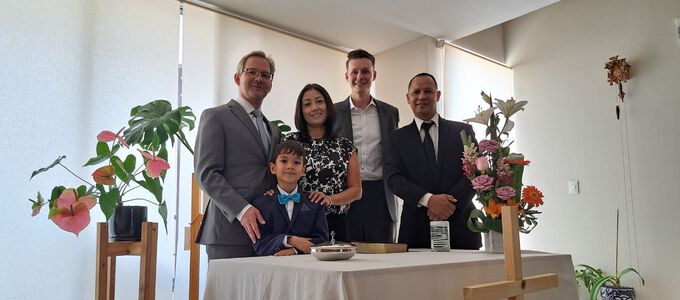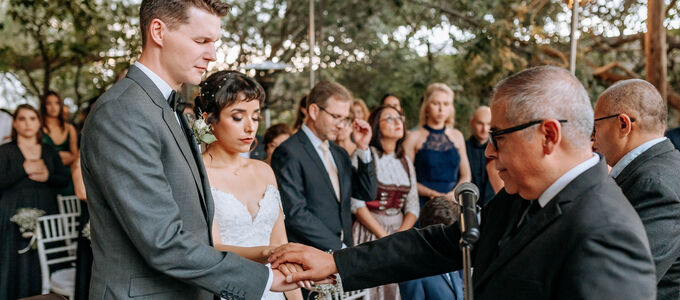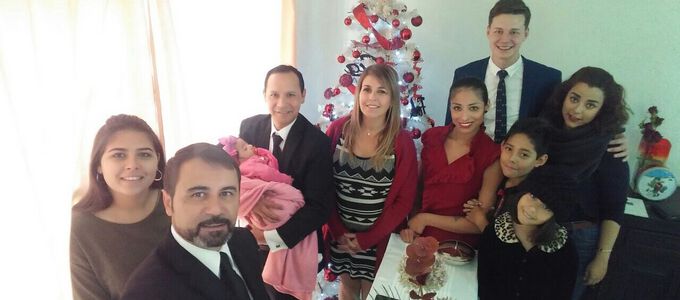
Job offers, the love of one’s life, or dissatisfaction with the way things are are sometimes reasons why people look for a new home in a foreign country. Making a living and living one’s faith in a foreign country are a challenge.
Niklas Hurst (31) moved from the tranquil town of Titisee-Neustadt in the Black Forest region of Germany to Santiago de Querétaro in central Mexico. Querétaro means “place of many people”. The capital of the state of the same name is home to 1.2 million people.
Niklas works there as a process engineer at the Mexican site of an international manufacturer of gear and transmission technology. When he had finished his degree in 2016, at the age of 24, he shifted his focus to Mexico, which lies between the USA and Central America. About 9,561 kilometres as the crow flies, an ocean, and seven time zones lie between his old and his new home. And the two cultures are also very different. There are a lot of positive things to be said about both worlds, even though he has experienced the negative sides of both countries too..
Being a Christian 24/7
Being a Christian every day is sometimes difficult. For Niklas, it is precisely the daily routine at work with all its demands that forces him to quickly focus on something else: “When I get up in the morning, my mind immediately kicks into gear. What do we have to do today? What is important today? What issues do we have right now and how can we solve them?”
Compared to the area where he lived in Germany, Mexico is complicated because there are few New Apostolic congregations and members. There are 19 congregations in the country, which is six times larger than Germany. In comparison, the German capital Berlin has twenty congregations, not to mention the approximately 1,700 congregations in Kinshasa (Democratic Republic of Congo).
Niklas feeds on all the experiences of faith that he was able to make in the past. The fact that video services were launched during the Covid pandemic was great. But it was strange to watch the YouTube services alone, to watch a large congregation with all the trappings—many ministers, a large choir, organ music, and the celebration of Holy Communion—have a divine service. “I poured myself a glass of red wine and put a loaf of bread next to it, to be part of it all,” Niklas explains. He is aware that this is not the body and blood of Christ, but empty food, so to speak. “But still, that’s how I handled it in the beginning.”
Creating a house congregation
When the restrictions were lifted, Niklas visited the small house congregation of Irapuato about 120 kilometres away. However, he hardly spoke any Spanish then “That means I went there, did not understand a word, and then left again.” And yet, “I have to go. It is part of me, part of my life. At some point you begin to miss it.” However, due to relocations a short time later, divine services can no longer be held in Iraquato. Since his uncle and his family also moved to the same area in Mexico in 2020, he made his living room available for divine services and, after speaking with the Apostle in charge, divine services have been held in Querétaro once a month since 1 January 2023. On one or two other Sundays, Niklas and his uncle take a bus to a congregation in the north of Mexico City, some 200 kilometres away. It is a long ride, some two-and-a-half hours each way on one of the most dangerous motorways. An average of 16,700 people are killed every year in accidents on Mexico’s roads.
When asked how big the congregation in northern Mexico City is, Niklas answers with a grin: “So last time, there were three of us. The Priest, my uncle, and me.” His longing for fellowship and Holy Communion prompts Niklas to put up with the long bus trip. Because church services are also held in his own living room, he always has a box of wafers at home. “I could munch communion wafers to no end,” he says. But as long as they are not consecrated, it is completely meaningless, he says. It was only once he was in Mexico that he really became aware of the value of the priestly ministry. Even though there was usually only one Priest available in his home congregation in Germany, there were always services with Holy Communion. It’s a given there.
I am at home here
When asked if he has never thought of joining another local Christian denomination so as not to be alone, Niklas’s answer is quick: “That the New Apostolic Church is the right church for me was clear to me fairly quickly.” Those who ask themselves this question should be quite open about it and talk to their Priest about it. That is how he found a sense of security, too, “I am definitely in the right church. I feel at home here.”
But is it really that easy when you are alone, with no one else around? “Well, this requires that I become active,” he says. “I can’t just say, well, God, there is no church here. So what can I do?” He himself made the experience that when God sees the desire and effort, He also creates opportunities and strengthens your faith. But it is not easy and the decision to live without God is very, very easy when moving away from home and one’s familiar church environment.
What Niklas wants to take with him
For Niklas, one thing is sure. Sooner or later he would like to move back to his old home with his family. But he has already learned a lot about himself and his faith. He has come to really appreciate the value of a congregation however small it may be. “When I eventually go back to Germany, I cannot take for granted that there will be an active congregation there either.” He says, “At some point you have to ask yourself the question, what is important to me? And if I then come to the conclusion: my faith is important to me, then the congregation and the fellowship will automatically be important too. I’m touched when I hear a choir and then I join in and sing in the choir.”
What is also important, he says, is that topics concerning our faith are discussed more openly within the congregation. “You can’t say after a divine service: so what‘s for lunch today?” The focus should automatically be on what you and the others experienced. One should talk about experiences of faith, how we can support one another, how we can edify each other in faith. “That is the interesting thing I have found out for myself here,” Niklas says.












